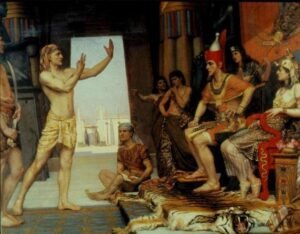The Bible contains many references to magicians, from the Chaldeans to the Egyptians. We’ll discuss frogs and gnats in this article, but we’ll also examine the role of the Magi, Sorcerers, and Astrologers. The Bible also tells us about magicians, but who were these ancient people? Do you remember the story of Joseph’s magician friend? Were they actually evil?
Sorcerers
Sorcerers in the Bible are those who practice the magical arts to wreak havoc and frighten the living. The word sorcerer comes from the Greek word magus, which means magician. In the Old Testament, sorcery was condemned and punished as a sin. However, it was also practiced by heathens and pagans. Therefore, the Bible has an important role to play in the discussion of sorcery.
In the Bible, the word sorcerer was related to the Greek word for pharmacy. Many pharmaceuticals today fall under the sorcery category. While pharmaceutical drugs are intended to treat physical ailments, sorcerers’ medicines essentially alter the mind and open a person to the spirits. Thus, most of the pharmaceutical drugs are considered witchcraft. Sorcerers used chemical compounds, such as benzodiazepines, to weaken the will and make it more receptive to evil spirits.
The name ‘Leviathan’ refers to the ruling spirit of pride. This spirit causes stubbornness, stiff-neckedness, and hardness of heart. In Psalm 74:14, the Lord promises deliverance and counseling to the people. If these are evil spirits, the Bible describes them as being cast into Hades. These spirits are also known as ‘cruel messengers’.
Astrologers
According to the Bible, astrology is not a legitimate form of divination. In the Book of Daniel, astrologists are called magicians and enchanters. It is also mentioned in Jeremiah 8:2 and Daniel 2:2. In the Bible, astrology is an inductive form of divination, which is forbidden by Leviticus 19:26. In Daniel 2:2, the king of Babylon asks for advice from people who use astrology, yet he gets no result.
According to the Bible, astrology is an ancient tradition that is incompatible with orthodox Christianity. It was even condemned in the Old Testament when practitioners were stoned to death.
Today, astrology is an abomination to God. Satan lies about astrology, and it is idolatry. God will never approve of idolatry, so it is wrong to use astrology to make decisions.
There are several sources that prove that astrologers are indeed magicians. The Old Testament, for example, mentions the Babylonians and the Pharisees as being magicians, and there are also references to astrologers in the Bible. However, some people disagree with the Bible. In the Bible, astrology is a form of divination that involves the study of the heavenly bodies.
The wise men were astrologers, but the Bible doesn’t state that they used astrology to find Jesus. It doesn’t say whether astrology prompted them to go home without informing Herod, which would have had negative consequences. But there are many other examples of magicians, including the witch of Endor, who summoned Samuel from the dead.
Chaldeans
The first written attestation of Chaldeans in the Bible comes from 852 BCE, when Assyrian king Shalmaneser III subjugated Mushallim-Marduk, chief of the Amukani tribe and the overall leader of the Kaldu tribes. Shalmaneser also captured and extracted tribute from the Baqani and Bet-Dakkuri tribes.
In Babylon, the word of God is alive and sharper than a two-edged sword. It pierces the soul, spirit, joints, and marrow, and can discern the thoughts of the heart. This is why the Chaldeans were able to answer the question of the king: no man on earth could fulfill it! As such, they were called to perform the secret arts.
While the word “Chaldeans” has multiple meanings, it does not necessarily mean “magic”. The term was once used to describe the entire southern region of Mesopotamia in Hebraic literature. But today, the term simply means “people from Chaldea” – a plain that was formed by deposits of the Euphrates and Tigris rivers and spanned about 160 km in width.
The ancient Chaldeans are often referred to in terms of their magic. Babylon was ruled by the Assyrian Empire, which was a powerful empire. The Assyrians did not have the strength to confront Babylon directly, so they relied on their allies, like the king of Elam, who was stronger than the Chaldeans.
The Chaldeans had a reputation for being magicians, and they became well-known as a consequence of this.

Magi
The word “magus” derives from the Greek language. This word is also found in the New Testament. In Acts 8, we find Simon Magus, a sorcerer who wants to purchase the apostles’ powers. The King James Version also refers to Elymas the magus, the man who is blinded. These men were the first to recognize Jesus as the Messiah, and they traveled far to worship him.
The number of Magi varies. The oldest Christian traditions list twelve. However, some traditions have fewer than twelve. Some believe that the Magi traveled with a small army and arrived in Jerusalem with great pomp.
Their journey probably included an international highway, likely infested with bandits. Some scholars say that the Magi were a royal group and that they possessed the knowledge of the Messiah and were worthy of an audience with the King.
The Magi brought gold, frankincense, and myrrh. It’s unclear who told them to bring these gifts, but it’s possible that Daniel had passed down instructions from generation to generation. The Magi’s gift may have reflected their understanding that the Messiah would be cut off after his birth. The Magi’s gifts of gold, frankincense, and myrrh were gifts given to kings, and they were used to anoint the dead.
Pharaoh’s servants
A story from the Bible tells us that a young woman became the wife of a Levite and bore a son. Then she hid the baby for three months. Then she dipped a basket in pitch or bitumen and placed it among reeds by the river. The next day, the daughter of Pharaoh came to bathe in the river and the young men and women followed her.
While the Bible and the Egyptian documents describe the same events, the biblical accounts of Pharaoh’s life and reign are polemical and literary. The Egyptian records also glorify pharaohs in unrealistic ways. In light of this, it is important to compare both sources with caution. The authors of the Bible and the Egyptian documents saw events through very different theological lenses. However, both texts provide interesting and important information about the pharaohs of ancient Egypt.
When Joseph was in prison, the cupbearer and the baker were his closest friends. Each of them had dreams about the future. God showed Joseph the meaning of the dreams. The baker and the cupbearer were eventually put into prison by Pharaoh. However, Pharaoh later forgave the cupbearer and the baker, and Joseph asked them for a favor before he left prison.
Simon Magus

The name Simon Magus is a misnomer. While it is difficult to say exactly who Simon Magus was, some scholars believe that he was an impostor. This belief stems from his alleged sexual immortality and his instituted mysteries of bodily fluids, collected in a degenerate manner. According to one apocryphal account, there were followers of Simon still living during the time of Jesus.
The name of Simon Magus also seems to have been influenced by the fact that Marcion, who was a follower of the Jesus movement, fails to mention the name and overtly identifies himself as Paul of Tarsus.
Another legend says that Simon Magus was a magician who lived in ancient Samaria. According to the Book of Acts, the magus had the supernatural power to transmit the Holy Spirit to his followers. This belief led many people to believe that Simon Magus was a Christian and that he was the founder of the Simonians, a sect that survived until the time of St. Peter. However, scholars have yet to discover the authenticity of these legends.
This legend was based on an incident in Acts 8:9, where the name “Magus” is mentioned. The King James Version translates the word “magus” as “used sorcery.”

